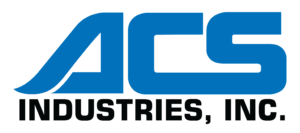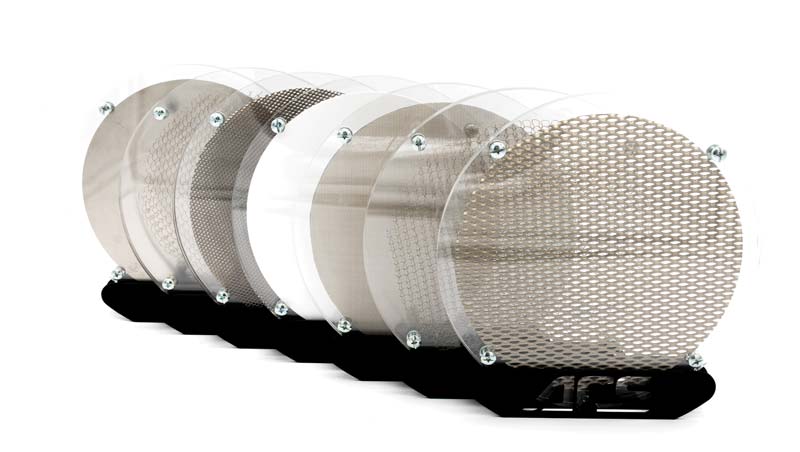The Role of Materials in Electrolysis Efficiency
Hydrogen electrolysis systems operate under constant extreme conditions, including constant electrical load, corrosive chemical exposure, and thermal cycling. Poor material choices can lead to premature degradation, downtime, or even failure.
In alkaline systems, knitted mesh elastic elements, often made from nickel, are placed between electrodes to enhance both performance and durability. These layers help distribute pressure evenly, maintain proper electrolyte spacing, and improve conductivity. They also compensate for minor variances in component tolerances and perform reliably across a range of temperatures, thanks to their high elastic range of compression.
High-conductivity materials help minimize energy loss, while corrosion-resistant metals prevent structural breakdown. Mechanical strength and dimensional stability allow components to withstand pressure, vibration, and prolonged use. In short, choosing the right materials supports safer, more efficient hydrogen production.
Key Material Demands in Electrolyzer Systems
Electrolyzers operate in a challenging environment of high voltage, reactive chemicals, and elevated temperatures. Materials must be carefully chosen not only for compatibility but for long-term performance under stress.
Key considerations include:
- Corrosion resistance: Essential for components exposed to acidic or alkaline electrolytes.
- Electrical conductivity: Critical for efficient current transfer and hydrogen output.
- Mechanical durability: Required to maintain integrity under pressure and repeated cycling.
- Gas permeability: Tightly controlled porosity minimized gas crossover and improves safety.
- Formability and scalability: Materials must support both complex geometries and volume manufacturing.
- Elasticity: Materials need to be rigid enough to withstand pressure and currents within the cell but flexible enough to accommodate thermal expansion and contraction.
ACS supports these performance demands with proven materials and engineering insight, helping OEMs optimize electrolyze performance from prototype to production. Reach out to discuss your specific project needs.
Electrolyzer Material Selection by Component
Each part of a hydrogen electrolyzer serves a distinct function, and each demands precise material selection for chemical compatibility, structural stability, and system longevity.
Electrodes:
Common materials include nickel (alkaline systems) and titanium (PEM systems), chosen for their conductivity and corrosion resistance.
Membranes:
PEM systems use polymer electrolyte membranes, while alkaline systems rely on porous separators. These materials must resist chemical attack and maintain performance at elevated temperatures and humidity.
Gaskets, Seals, and Mesh:
Stainless steel and proprietary alloys are frequently used to prevent leakage and preserve cell integrity, ACS supplies high performance knitted and woven wire mesh used for flow field reinforcement, compression pads, and gas filtration.
Housing and Structural Components:
These must endure both internal chemical exposure and external mechanical forces. Coated steels, specialty alloys, and, in certain critical areas, titanium, are preferred for their corrosion resistance and formability.
Expanded Titanium: A Game Changer in Electrolyzer Material Design
Titanium is increasingly used in electrolyzer systems, particularly PEM and alkaline designs, due to its exceptional corrosion resistance, thermal stability, and conductivity. As ACS, we have taken titanium innovation further with proprietary manufacturing capabilities that directly support next-generation hydrogen electrolysis.
Our advanced process allows us to expand titanium with pore sizes ranging from just 10 microns to several centimeters, offering customizable performance based on specific system needs, from porous transport layers (PTLs) to flow fields. This high degree of conformity improves gas and fluid flow, reduces pressure drop, and enhances overall electrolyzer efficiency.
We also lead the industry in diffusion bonding titanium, a process never before performance at commercial scale. Developed in-house and now in full production at our Mexico facility, this technique enables ultra-strong, seamless joins between titanium layers, ideal for durable, high-performance components.
Combined with real-time machine vision quality control and custom-built expanding machines, our titanium capabilities represent a new benchmark in electrolyzer material selection. For OEMs seeking performance, scalability, and innovation, ACS offers a unique materials advantage.
Choosing the Right Partner for Material Selection
In hydrogen electrolysis, material selection isn’t just a design decision, it is a strategy for performance, safety, and long-term success. Partnering with an experienced supplier ensures every component meets the system’s demanding operating conditions.
ACS Industries brings decades of expertise in hydrogen fuel cell components and custom-engineered materials, including pioneering work in expanded and diffusion-bonded titanium. Collaborating with ACS reduces risk, improves durability, and helps accelerate the clean energy transition.
Contact our experts today to discuss your hydrogen electrolysis material needs and discover how our advanced solutions can elevate your electrolyzer systems.


